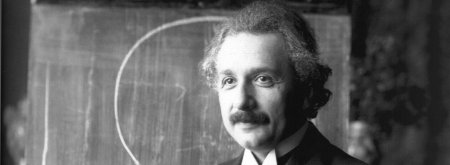Did Einstein Believe in God?
According to Richard Dawkins, the gifted exponent of evolution, Einstein was an atheist: “Einstein sometimes invoked the name of God, and he is not the only atheistic scientist to do so, inviting misunderstanding by supernaturalists eager to misunderstand and claim the illustrious thinker as their own.”[1] Dawkins gives a definition of atheism as believing that there is “nothing beyond the natural, physical world, no supernatural creative intelligence lurking behind the observable universe.”[2]
He explains that some scientists sound religious, but if you delve more deeply into their thinking, they are in fact atheists. He presents Einstein as a prime example, and describes Einstein’s religion as pantheism, which he calls “sexed-up atheism”.[3] According to Dawkins, “The one thing his theistic critics got right, was that Einstein was not one of them. He was repeatedly indignant at the suggestion he was a theist.”[4] But has Dawkins totally misunderstood Einstein? Is there clear unequivocal evidence that Einstein did believe in God?
It is important to get some definitions straight at the outset, because Dawkins tells us that in his opinion “to deliberately confuse the two understandings of God is an act of intellectual high treason.”[5] Strong words indeed. In the Oxford English Dictionary we find the following definitions: theism is the belief in a deity, or deities, as opposed to atheism; and the belief in one God, as opposed to polytheism or pantheism. It is important to note that, firstly, the definition of theism does not necessarily include the notion that God is personal. Secondly, atheism is defined as a disbelief in, or denial of, the existence of a God. Thirdly, pantheism is a belief or philosophical theory that God is not only immanent (indwelling and sustaining the universe) but also identical with the universe.
Dawkins explains that in dealing with Einstein’s religious views he relied on Max Jammer’s book Einstein and Religion. Dawkins wrote: “The extracts that follow are taken from Max Jammer’s book (which is also my main source of quotations from Einstein himself on religious matters).”[6] However a very different picture emerges when we study what Einstein actually said, again as recorded in Jammer’s book. It seems Dawkins needs to be reminded of the ‘Ten New Commandments’ he lists in his own book. The seventh reads: “Test all things; always check your ideas against the facts, and be ready to discard even a cherished belief if it does not conform to them.”[7] The following quotations from Einstein are all in Jammer’s book:
“Behind all the discernible concatenations, there remains something subtle, intangible and inexplicable. Veneration for this force is my religion. To that extent, I am in point of fact, religious.”[8]
“Every scientist becomes convinced that the laws of nature manifest the existence of a spirit vastly superior to that of men.”[9]
“Everyone who is seriously involved in the pursuit of science becomes convinced that a spirit is manifest in the laws of the universe – a spirit vastly superior to that of man.”[10]
“The divine reveals itself in the physical world.”[11]
“My God created laws… His universe is not ruled by wishful thinking but by immutable laws.”[12]
“I want to know how God created this world. I want to know his thoughts.”[13]
“What I am really interested in knowing is whether God could have created the world in a different way.”[14]
“This firm belief in a superior mind that reveals itself in the world of experience, represents my conception of God.”[15]
“My religiosity consists of a humble admiration of the infinitely superior spirit, …That superior reasoning power forms my idea of God.”[16]
What gives the lie to Dawkins’ claim that Einstein was an atheist is Einstein’s repeated references to “a superior spirit”, ”a superior mind”, "a spirit vastly superior to men”, ”a veneration for this force” etc. etc. This is not atheism. It is clear Einstein believed that there is something beyond the natural, physical world – a supernatural creative intelligence. Further confirmation that Einstein believed in a transcendent God comes from his conversations with his friends. David Ben-Gurion, the former Prime Minister of Israel, records Einstein saying “There must be something behind the energy.”[17] And the distinguished physicist Max Born commented, “He did not think religious belief a sign of stupidity, not unbelief a sign of intelligence.”[18] Therefore on Dawkins’ own definition, Einstein is not an atheist. On one point however Dawkins is correct: Einstein did not believe in a personal God, who answers prayers and interferes in the universe. But he did believe in an intelligent mind or spirit, which created the universe with its immutable laws.
According to Dawkins, “Einstein was repeatedly indignant at the suggestion he was a theist.”[19] The evidence from Jammer’s book is the exact opposite. What Einstein actually said is:
“I am not an atheist, and I don’t think I can call myself a pantheist.”[20]
“Then there are the fanatical atheists whose intolerance is of the same kind as the intolerance of the religious fanatics and comes from the same source.”[21]
"There is harmony in the cosmos which I, with my limited human mind, am able to recognise, yet there are people who say there is no God. But what really makes me angry is that they quote me to support such views."[22]
According to Jammer, “Einstein always protested against being regarded as an atheist.”[23] What evidence then does Dawkins have that Einstein was indignant at being called a theist? Dawkins needs to explain this very peculiar discrepancy. Lastly Dawkins argues that science and religion are incompatible. Again Einstein takes the opposite point of view: “A legitimate conflict between science and religion cannot exist. Science without religion is lame; religion without science is blind.”[24]
Max Jammer was a personal friend of Einstein and Professor of Physics at Bar-Ilan University in Israel. His book is a comprehensive survey of Einstein’s writing, conversations and speeches on God and religion. In his book, Jammer wrote, “Einstein was neither an atheist nor an agnostic”[25] and he added, “Einstein renounced atheism because he never considered his denial of a personal God as a denial of God. This subtle but decisive distinction has long been ignored.”[26] His conclusion is that Einstein believed in God, albeit not a God who answers prayers. Eduard Büsching sent a copy of his book Es gibt keinen Gott (There is no God) to Einstein, who suggested a different title: Es gibt keinen persönlichen Gott (There is no personal God).[27] However in his letter to Büsching, Einstein commented, “A belief in a personal God is preferable to the lack of any transcendental outlook.”[28] According to Jammer, “Not only was Einstein not an atheist, but his writings have turned many away from atheism, although he did not set out to convert anyone”.[29] Einstein was very religious; he wrote, “Thus I came – despite the fact that I was the son of entirely irreligious (Jewish) parents – to a deep religiosity.”[30]
On Spinoza, Einstein said, "I believe in Spinoza's God, who reveals himself in the orderly harmony of what exists, not in a God who concerns himself with the fates and actions of human beings."[31] Some – like Dawkins – think Spinoza equated God with the material universe (pantheism), but Spinoza himself made clear this is mistaken. Spinoza wrote, "The view of certain people that I identify God with nature is quite mistaken."[32] The French philosopher Martial Guéroult suggested the term panentheism, rather than pantheism, to describe Spinoza’s view of the relation between God and the universe. The Oxford English Dictionary defines ‘panentheism’ as the theory or belief that God encompasses and interpenetrates the universe, but at the same time is greater than, and independent of it. So panentheism is similar to pantheism, but crucially in addition believes that God exists as a mind or a spirit. The idea that God is both transcendent and immanent is also a major tenet of both Christianity and Judaism.
Richard Dawkins describes faith as evil: “I think a case can be made that faith is one of the world's great evils, comparable to the smallpox virus but harder to eradicate. Faith, being belief that isn't based on evidence, is the principal vice of any religion.”[33] However some of Einstein’s theories were not demonstrated scientifically until years after publication. Yet Einstein had faith in them. Nor were all Newton’s theories established at the time. Newton, Darwin and Einstein all had faith in their theories, before they were shown to be true. We all have many intuitive beliefs that we are justified in holding, even if we cannot demonstrate their validity, such as belief in the past, belief in rationality and belief that we are not dreaming. It is impossible to live life without faith. Indeed Einstein – like many other scientists – believed that science is based on a faith in the rationality of the universe. In his own words, “Ultimately the belief in the existence of fundamental all-embracing laws rests on a sort of faith.”[34] Therefore to describe faith as being as evil as smallpox is frankly absurd.
But isn’t Einstein’s understanding of an impersonal God totally removed from Christian, Jewish and Muslim thinking? Max Jammer refers in his book to the leading theologian Hans Küng, who pointed out that the Bible never refers to God as a person. Küng explains, “Of course in my youth I had a simple, naïve, anthropomorphic understanding of God. At the beginning of life that is normal. It is less normal for a grown man or woman to preserve his or her childlike understanding.”[35] For Küng, “God is not a person as man is a person…. God transcends the concept of person.”[36] Or as C.S. Lewis put it, God is not less than personal but is “beyond personality”.[37] Küng explains that part of the problem here lies in the meaning of the word ‘person’ – derived from the Latin ‘persona’ – which has changed over time. It originally meant a mask used by an actor on the stage.[38] So one actor could play several parts, using different ‘personae’. In this way Jesus may be seen above all as the ‘persona’ of God entering the human stage. This original meaning of the word has been almost completely lost.
To sum up: Einstein was – like Newton before him – deeply religious and a firm believer in a transcendent God. However Einstein rejected anthropomorphic and personal understandings of the word ‘God’. His beliefs may be seen as a form of Deism: "the belief in the existence of a Supreme Being as the source of finite existence, with rejection of revelation and the supernatural doctrines of Christianity" (The Oxford English Dictionary). If any intellectual high treason has been committed, it has been committed by Dawkins himself, who has failed to deal carefully with what Einstein actually said, thereby confusing two very different understandings of God. He should have paid more attention to Max Jammer’s book, and to the conclusions Jammer reached after studying all the evidence. There is another conclusion to be drawn from this: Dawkins has pointed out the attempt in America to rebrand atheists as ‘brights’, implying atheists are clever and theists stupid. If Einstein was clearly a theist, like Newton, this is arrant nonsense. This should help to stop the bullying of Christian children, who are told they are stupid to believe in God. One girl personally known to the author was bullied so much for being a Christian that she had to move schools. So, after all of Dawkins’ rhetorical bluster and verbal swagger, we are left with fallacious reasoning and factual errors – a case of ‘argument weak, shout louder’.
References
[1] Richard Dawkins, The God Delusion (London Transworld 2006), p.34.
[2] Dawkins, p.35.
[3] Dawkins, p.40.
[4] Dawkins, p.39.
[5] Dawkins, p.41.
[6] Dawkins, p.37.
[7] Dawkins, p.299.
[8] H.G. Kessler, The Diary of a Cosmopolitan (London: Weidenfeld and Nicolson, 1971), p.322, quoted in Max Jammer, Einstein and Religion (Princeton, NJ: Princeton University Press. 1999), p.40.
[9] A. Einstein to P. Wright 24 January 1936, Einstein Archive reel 52-337; Jammer, p.93.
[10] Quoted in H. Dukas and B. Hoffman, Albert Einstein – The Human Side (USA Princeton University Press 1981); Jammer, p.144.
[11] Z. Rosenkranz, Albert through the Looking Glass (Jewish National Library Jerusalem, 1998), pp.xi, 80; Jammer, p.151.
[12] Einstein in conversation with W. Hermann in Hermann’s book Einstein and the Poet (USA Branden Press, 1983), p.132; Jammer, p.123.
[13] E. Salaman, A Talk with Einstein The Listener 54 (1955):370-371; Jammer, p.123.
[14] E. Strauss, Assistant bei Albert Einstein in C. Seelig, Helle Zeit-Dunkle Zeit (Europa Verlag, Zurich, 1956), p.72; Jammer, p.124.
[15] Albert Einstein, Ideas and Opinions (New York: Random House 1954), p.255; Jammer, p.132.
[16] Albert Einstein, The Quotable Einstein, ed. Alice Calaprice (Princeton, NJ: Princeton University Press, 2005), pp.195-6.
[17] Jammer, p.96.
[18] Jammer, p.96.
[19] Jammer, p.39.
[20] G.S. Viereck, Glimpses of the Great (Macaulay, New York 1936) p.186; Jammer, p.48.
[21] Einstein to an unidentified addressee dated 7th August 1941. Einstein archive reel 54-927; Jammer p.97.
[22] Einstein in a conversation with Hubertus zu Löwenstein, in Löwenstein’s book Towards the Further Shore (London Victor Gollancz 1968), p.156; Jammer, p.97.
[23] Max Jammer, Einstein and Religion (Princeton, NJ: Princeton University Press, 1999), p.150.
[24] Albert Einstein, Science and Religion, printed in A. Einstein Ideas and Opinions (Crown, New York 1954,) pp.44-49 quote on p.46; Jammer p.31.
[25] Jammer, p.96.
[26] Jammer, p.150.
[27] Jammer, p.50.
[28] A. Einstein letter to Büsching; Jammer, p.149.
[29] Jammer, p.151.
[30] Jammer, p.19.
[31] In 1929, Einstein was asked by Rabbi Herbert S. Goldstein whether he believed in God. Einstein responded by telegram. Jammer, p.49.
[32] B. Spinoza, Correspondence of Benedict de Spinoza, Wilder Publications (March 26, 2009), letter 73.
[33] Richard Dawkins, 'Is Science a Religion?', The Humanist (January/February 1997, American Humanist Association).
[34] Einstein to P. Wright, 24 January 1936. Einstein archive reel 52-337; Jammer, p.93.
[35] Hans Küng, What I Believe (London Continuum 2010), p.102.
[36] Hans Küng, Does God Exist? (London SCM 1984), pp.631-633.
[37] C.S. Lewis, Mere Christianity (London Fontana 1955), p.136.
[38] Hans Küng, Does God Exist?, pp.631-633.
© 2011 John Marsh
This article is published on bethinking.org by the kind permission of the author.
A slightly revised version of this article forms part of 'Chapter 7: Liberal Delusions: Religion is Untrue and Harmful' in the author's book The Liberal Delusion (Arena Books, 2012).



